
In recent months, the heaviest-hitting social networks on the Internet have enacted new terms which prohibit or otherwise severely limit "thinspiration" and other pro-eating disorder imagery and ideology. Instagram, Facebook, Pinterest, and Tumblr, which are all extremely visual outlets, have made very public vows to create online spaces free from pro-ED content. How've they been doing?
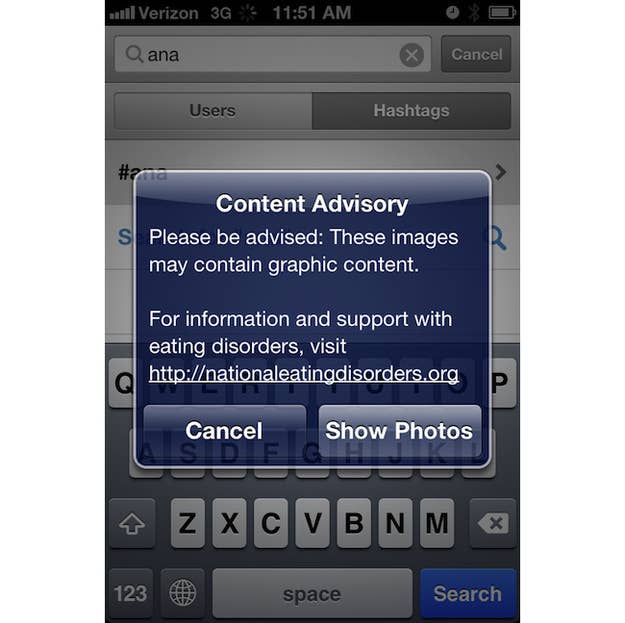
The policy:
Any account found encouraging or urging users to embrace anorexia, bulimia, or other eating disorders...will result in a disabled account without warning.
The reality:
The network has made tags like #thinspiration, #probulimia, and #proanorexica unsearchable. Although this was an enormous step for Instagram, users can still easily find over 300,000 graphic photos by searching the tag #ana, although it first displays the warning pictured above. Instagram's logic in keeping the tag live is that its pictures will not always be promotional of eating disorders and that they don't want to quash pictures concerned with survivors' experiences and recoveries. But, like:
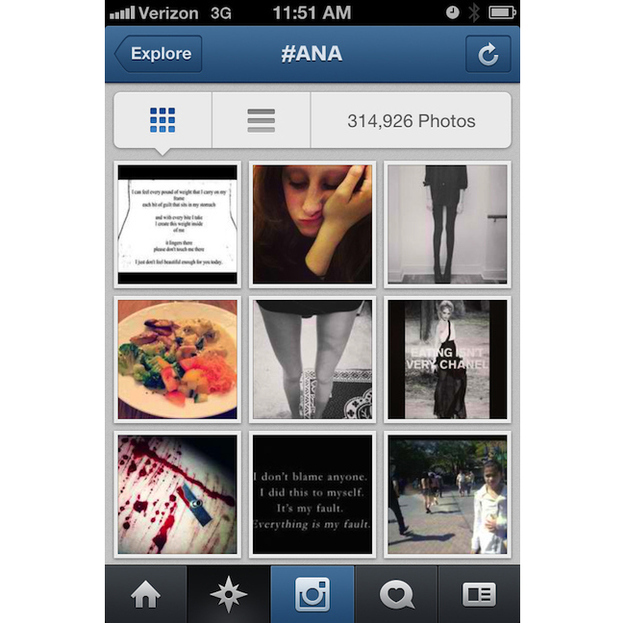
While a few photos seem innocuous enough, they're made insignificant when placed beside bloody razors, bruised, stick-thin thighs, and quotes that exhort others not to eat. These sorts of images abound on the application despite the above policy, and other tags, such as #thinspire, are still searchable without a disclaimer. It would appear that Instagram largely relies on its users to report disallowed content, which seems ineffectual when the majority of people posting under and searching the #ana tag are those looking to perpetuate it. The ban of certain tags is a solid start, but more needs to be done if Instagram is serious about eradicating the content from its network.
Grade: D
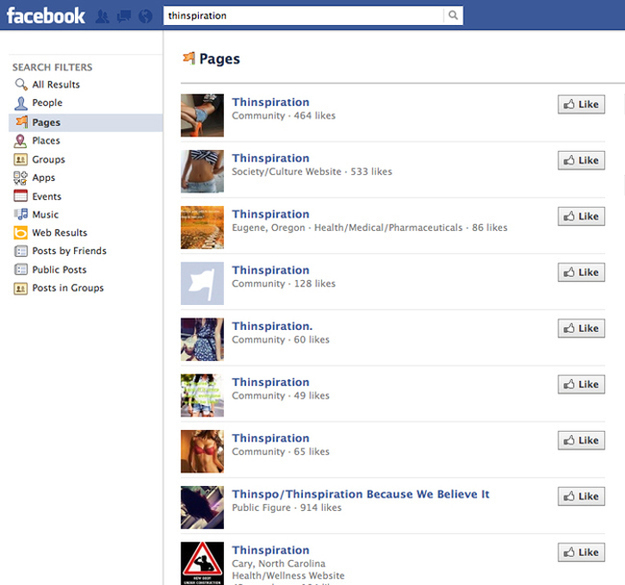
The policy:
Facebook takes threats of self-harm very seriously. We remove any promotion or encouragement of...eating disorders.
The reality:
Searches for "pro-ana" and "pro-mia" didn't yield any alarming results — in fact, they largely redirected to anti-ED pages. But typing in "thinspo" and "thinspiration" returns a list of pages rife with pictures that are common to eating disorder blogs, like those which fetishize thigh gaps and miniscule waistlines. Facebook's thinspiration groups tend to look more like this: Thinspo/Thinspiration Because We Believe It. It's the most-liked thinspiration page on the site, but avoids language that refers directly to anorexia and bulimia. Instead of advocating starvation, it posts pictures of fruit. Few of the photos of actual people depict disturbingly thin women; abdominal muscles are favored over rib cages. It could be easily (and validly) be argued that the group's skirting of overtly pro-ED terminology is an insidious tactic used to circumvent Facebook's policy. However, it also shares images like this:
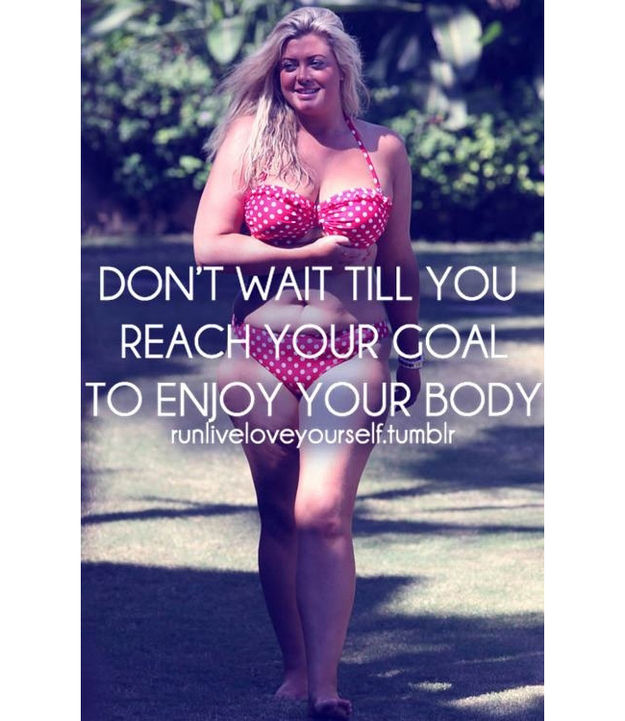
Facebook actively enforces limitations on pro-eating disorder content and monitors the activity of "diet" groups closely, which seems far more effective in curtailing pro-ED imagery and discussion than the community-driven efforts of other sites. Only a few truly hardcore thinspiration groups still exist on Facebook, and they're very small. While the site can't control how people use and perceive pictures of gaunt shoulders and stark collarbones, it does an admirable job in remaining aware of, and removing, more extreme expressions of thinspiration.
Grade: B+
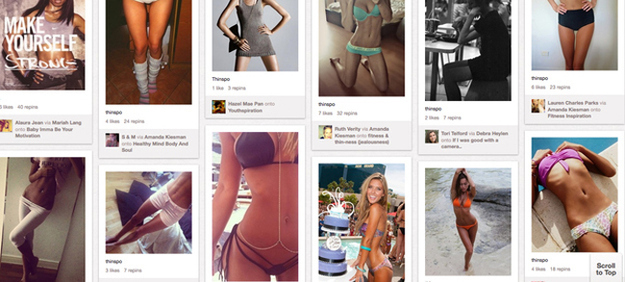
The policy:
You agree not to post User Content that creates a risk of harm, loss, physical or mental injury, emotional distress, death, disability, disfigurement, or physical or mental illness to yourself, to any other person, or to any animal.
The reality:
One of Pinterest's most popular themes is "Health and Fitness," as they categorize it. But it features a lot of diet porn and photos of emaciated women. These are often tagged "thinspo" and "thinspiration," which the site allows, but the following message comes up upon searching for them:
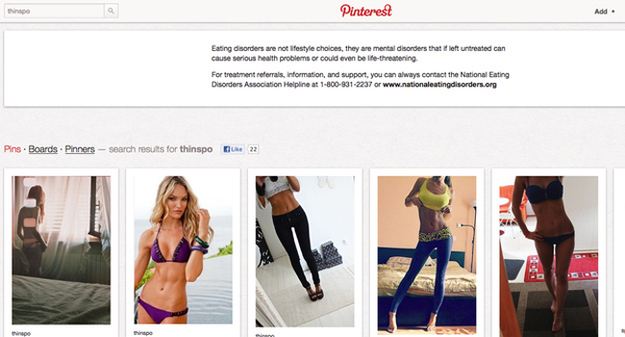
While the frustrating pictures of two-dimensional stomachs and lusted-after thigh gaps aren't going anywhere, it's heartening to see Pinterest acknowledge the role that images like these play in eating disorders. Additionally, the site's #proana and #anorexia tags are largely filled with pictures that encourage and celebrate recovery, although there are still some quotes and pictures that are straightforwardly pro-ED. Pinterest is off to a good start, but based on the above photos, it needs to continue to work hard in redirecting the starvation-as-beauty culture of the site.
Grade: C
Tumblr
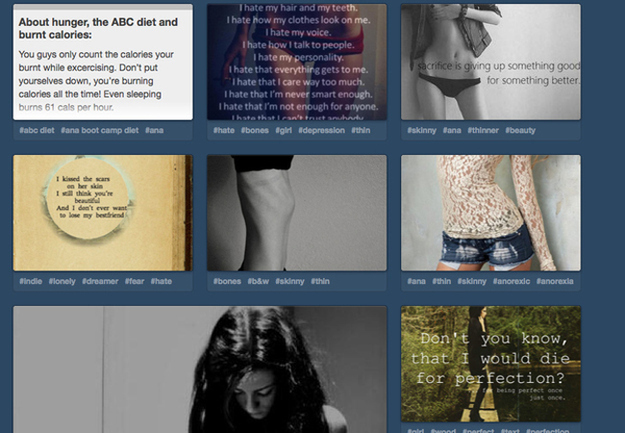
The policy:
Don't post content that actively promotes or glorifies self-harm. This includes content that urges or encourages readers to...embrace anorexia, bulimia, or other eating disorders...dialogue about these behaviors is incredibly important and online communities can be extraordinarily helpful to people struggling with these difficult conditions. We aim to sustain Tumblr as a place that facilitates awareness, support and recovery, and to remove only those blogs that cross the line into active promotion or glorification of self-harm.
The reality:
The "line" that Tumblr refers to in their guidelines appears to be a very, ahem, thin one, as there's still plenty of content on the site that is unquestionably pro-ED, as evidenced in a screencap of a tag search for "ana." Tumblr appears to have a very lax attitude toward keeping watch over pro-anorexia and bulimia posts that appear on the site, and while they claim that this is because they don't want to silence dialogues about users' experiences or recoveries within their eating disorders, they've been allowing plenty of flagrantly pro-ED posts to persist on the site:
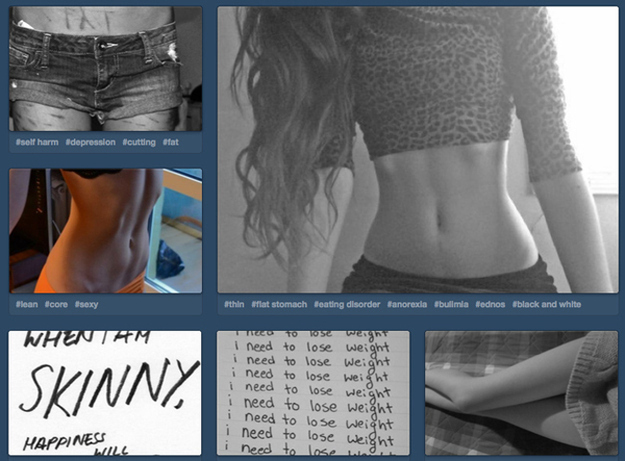
I didn't find pictures that were quite as grisly as the ones that continue to appear on Instagram, but these still obviously romanticize self-harm. It's a cause for concern that on a website that seeks to provide "solace, community, dialog, understanding, and hope" for "people struggling with these behaviors," the tags associated with them are cluttered with possible triggers. Interestingly, a search for "thinspo" redirects to the "LOL" tag, which I guess is one way of handling things, however ham-fistedly.
Grade: D+
